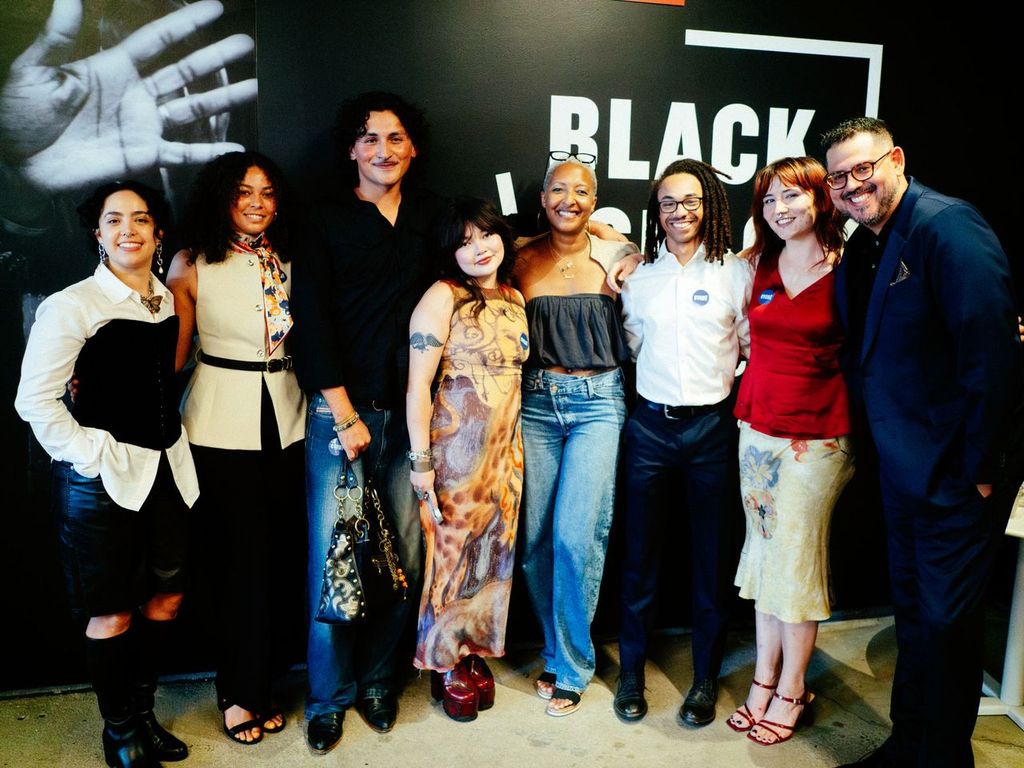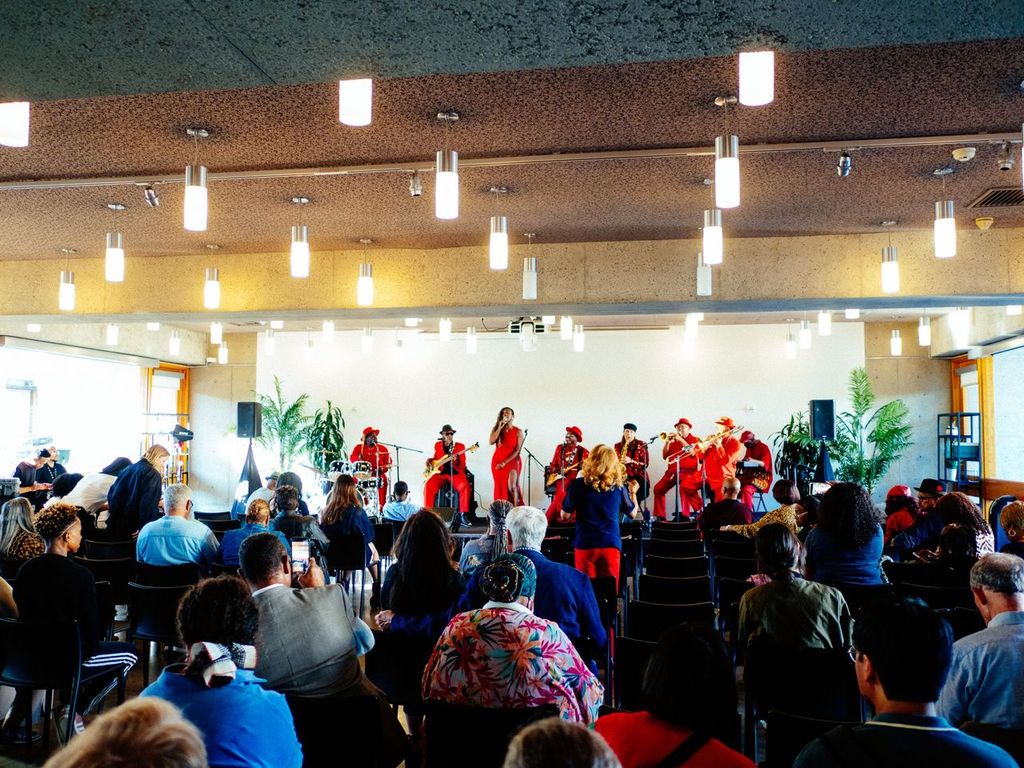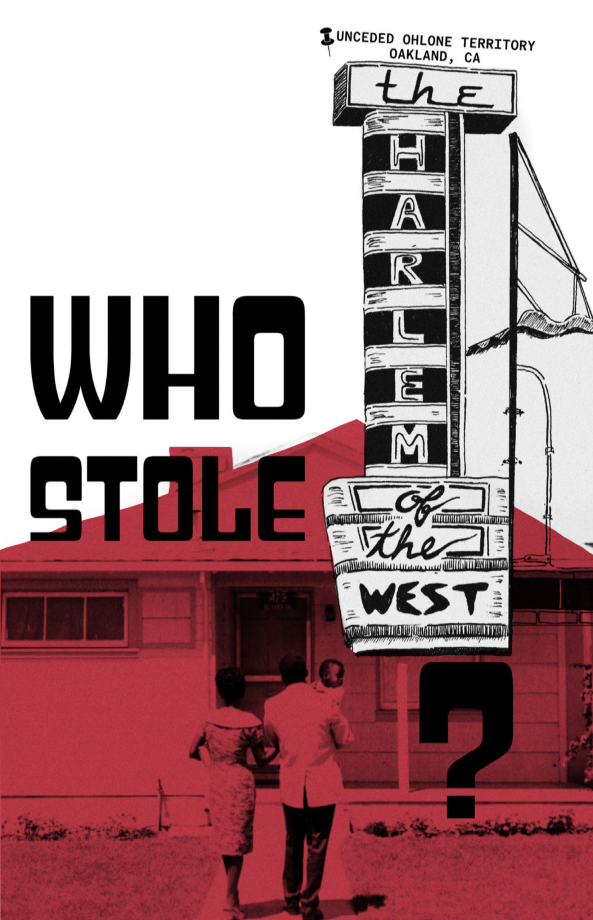UC Berkeley student collective Archive of Urban Futures shines at new OMCA exhibit
Through archival work, community workshops, and shared creative projects, the collective explores how generations of Black Oakland communities faced waves of dispossession, and asks how to imagine a future city that breaks these cycles.

Photo courtesy of Clara Pérez Medina
July 25, 2025
The mood at the opening of “Black Spaces: Reclaim and Remain” at the Oakland Museum of California (OMCA) on July 17 was ebullient, with hundreds of attendees in the museum reception hall enjoying the sparkling sounds of the West Coast Blues Society. Inside the exhibit’s hallways, the joyous atmosphere was tempered by a reverential, at times heavy, quiet. Visitors pointed to images, maps and film installations: There I am, or there we were.
The exhibit, which opened to the public July 18 and runs through March 1 of next year, foregrounds how generations of Black Oakland communities faced waves of dispossession due in part to urban infrastructure projects that resulted in the demolition of their homes and community spaces. It also resists narrating this history’s end, continuously inviting the exhibit visitor to remember the past — through artifacts, maps, archival footage and images — in order to imagine the city’s future anew.
The exhibit’s second half, “3 Perspectives,” features the work of the Archive of Urban Futures (AUF) and their community partners, Moms 4 Housing; the visionary conceptual artist Adrian Burrell; and the blink!LAB architect June Grant. AUF is composed of UC Berkeley graduate students and former undergraduates, who under the leadership of Brandi Thompson Summers have since 2022 worked to create a theoretically vibrant, community-responsive archive of Black Oakland’s past, present and possible futures.

Photo by Clara Pérez Medina
Summers, an Oakland native and former professor of geography at Berkeley, now professor of African American and African Diaspora Studies at Columbia University, guided AUF students in drawing connections between the politics of housing, Black dispossession and visual storytelling. She encouraged students in the collective to embrace the service-based orientation of the project — namely, to be directly responsive to the Black community members they partnered with — while also considering what would be of deepest service to themselves as budding researchers and artists.
“Too often, students think that there’s a test at the end or a certain skill necessary to do this work,” Summers said. “I’ve found that with these students, locating their genius is part of the best things that have come around.”
Over the course of three years, the group — composed of graduate students in geography and cultural anthropology as well as undergraduates, many of whom came to the project through the Undergraduate Research Apprenticeship Program — conducted oral histories, led community workshops, and dug deep into the city of Oakland’s public archives.
Over time, this work resulted in a 7-minute film, “The Archivists” (2025), two richly stimulating student zines, and historical timelines of the Black experience of the city, all of which are incorporated into the museum display. The installation’s framing, cordoned off by a stack of metal filing cabinets, gestures to the traditional institutional contexts of an archive, one which the group seeks to liberate through ongoing creative intervention.

Photo by Clara Pérez Medina
“The Archivists,” which was directed by geography doctoral candidate Clara Pérez Medina, captures the process of approaching an archive in this spirit, following AUF members as they comb through maps and policy documents, film oral histories with Moms 4 Housing, and sift through photos and other ephemera. It is a direct and arresting window into the work, one that Pérez Medina hopes will invite current Berkeley students to engage more deeply with Black histories of the Bay Area.
“Being able to learn about the place you are for these four, five or two years gives you tools to learn about the next place that you will be, and hopefully, to be a better participant and understand the politics of where you are,” said Pérez Medina. “If you start with the Black histories of a place, you will better grasp the root of why a place came to be the way it is now.”
AUF’s main community partner, Moms 4 Housing, is a collective of unhoused and marginally housed mothers advocating for housing as a human right in the context of the Bay Area’s housing affordability crisis. The group was formed in the winter of 2019, when three Black mothers and their children moved into a vacant property at 2928 Magnolia St. in West Oakland in an act of civil disobedience. Together with now-Oakland City Councilmember Carroll Fife, their actions drew national and international attention to the lived effects of the housing crisis on vulnerable city residents.
“We wanted to highlight the contradictions of there not being enough housing, because there absolutely is enough housing for every homeless person in Oakland.”
Dominique Walker, one of the three original occupiers of Moms 4 Housing
After being arrested and evicted in January 2020, Walker and the other moms won a public victory when California governor Gavin Newsom and then Oakland Mayor Libby Schaaf negotiated for a community land trust to purchase the home, which was developed into a transitional housing center for other mothers experiencing homelessness. Their movement led to legislative changes, such as a bill that required foreclosed homes to be sold individually rather than bundled, thereby limiting the scope of widespread speculation and redevelopment.
“This is Black mothers standing up for themselves,” said Dominique Walker, one of the three original occupiers of Moms 4 Housing, who attended the exhibition opening with her children. Walker, who grew up in Oakland and moved away to go to college in Mississippi, described moving back in 2019 and finding the city “unrecognizable” as she searched for — and could not find — accessible housing options.
“We wanted to highlight the contradictions of there not being enough housing, because there absolutely is enough housing for every homeless person in Oakland,” said Walker. “Because of policies, because of capitalism, it just sits there. And folks are dying — being out on the street equals death.”
A replica of a home the moms occupied adjoins the AUF collective’s display, in what may be the heart of the OMCA exhibit. A space heater and couch strewn with children’s toys sit under a running loop of Walker’s youngest child taking his first steps, along with a display case of memorabilia representing the achievements the mothers went on to make after securing stable housing. In museum offerings that roam from deep history telling to imagining Black Oakland far into the future, the Moms 4 Housing room harnesses visitors’ full attention to the living stakes of the present.

Courtesy of the Archive of Urban Futures
In addition to their close work with the Moms 4 Housing collective, AUF members also explored much longer historical timelines of Black experience in Oakland, mining public archives housed in the Oakland Public LIbrary — the Oakland History Center and the African American Museum and Library at Oakland — as well as the Institute of Governmental Studies Library at UC Berkeley.
The rich visuals they uncovered and retrieved inform the striking aesthetics of two student-produced zines. The first, “Who Stole the Harlem of the West?”, breaks down key terms, historical events and takeaways surrounding the politics of housing in Oakland into digestible bites, inviting readers to get informed and ask big questions. Co-produced by alumni Krista McAtee and Mateo Villa, the zine’s title refers to the once thriving hub of Black-owned businesses along 7th Street in West Oakland that was enervated by city planning policies which dislocated thousands of Black residents, turning many from homeowners into renters.

Courtesy of the Archive of Urban Futures
“How Will You Remember Home?”, co-produced by McAtee and Villa along with geography graduate students Maya Sapienza and juleon robinson, invites the reader to slow down and consider the art and stakes of capturing one’s own personal archive, one that might resist ongoing forces of erasure. Guiding us through domestic spaces — the front porch, living room, bedroom and kitchen — it breaks down their components into parts to inspect and capture, embellished by black-and-white archival photographs that somehow feel at home in the zine’s colorful pages.
“What’s the view from your porch, stoop or doorway?” it asks. “What do you see, hear, and feel from this spot? Map the rhythm of passing cars, the pattern of foot traffic, conversations overheard, scents carried by the breeze.”
Reflecting on the importance of the everyday, robinson said that, for him, a focus on the mundane contours of neighborhood life helps shift attention toward recognizing the role of community partnerships and acts of resistance that extend beyond tales of individual heroism.
“The Archive is pushing against forgetting, or a rendering of working class Black spaces in the Bay Area as disposable,” robinson said. “Normal, everyday people can band together with their neighbors and resist these transformations in space. There’s an immense amount of power in being in community and trying to protect one’s community from these forces of dispossession.”